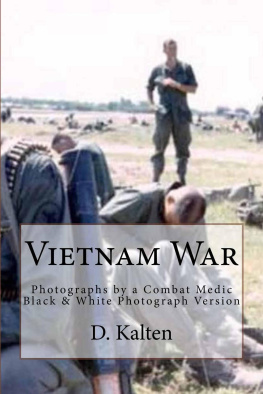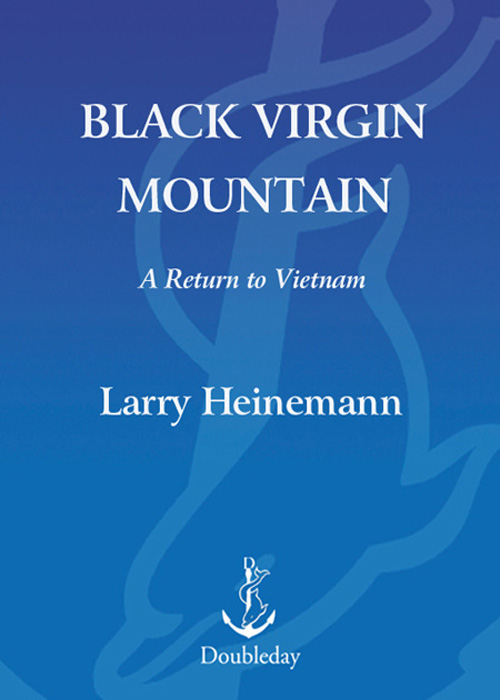
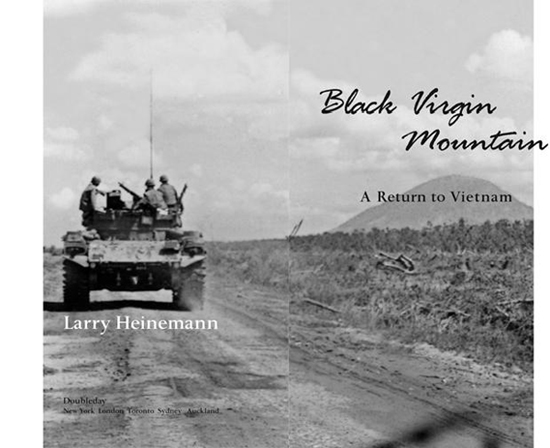
Contents
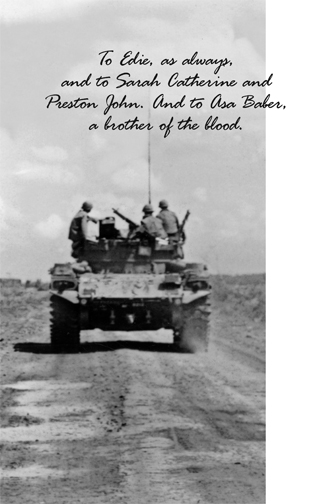
There isnt a train I wouldnt take,
no matter where its going.
Edna St. Vincent Millay
We are not always right
about what we think will save us.
Bruce Weigl
Acknowledgments
Many thanks to the John Guggenheim Foundation and the William Fulbright Scholarship Program for their support. My heartfelt thanks to Kevin Bowen and the men and women of the William Joiner Center who have given me something I can never repay. My best and sincerest good wishes to Huu Thinh and the gracious men and women of the Vietnam Writers Association; to Dr. Le Van Thuyet, Director of the Office of International Relations of Hue University and to his superbly efficient and hospitable staff; to singer, composer, and spirited boon companion Vo Que of Hue City; to the kitchen folks of Vuon Lan Restaurant, and the cyclo guys and flower ladies of the Ben Ngu Market who treated me like family. One thousand blessings to you all.
Larry Heinemann
Swift Lake, Wisconsin
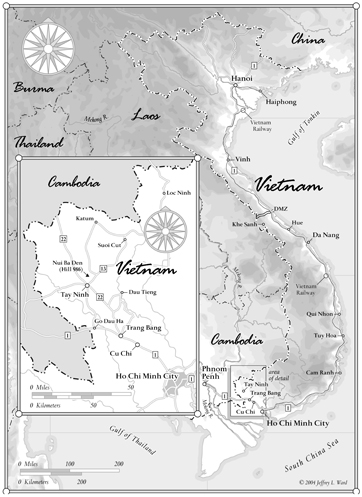
Several Facts
I was a soldier once, and did a years combat tour in Vietnam with the 25th Infantry Division at Cu Chi and Dau Tieng from March 1967 until March 1968.
The town of Cu Chi, twenty miles or so northwest of Saigon, straddled Highway #1 (see map) and was profoundly undistinguished. The American base camp was just outside of town. Nowadays it is famous to the world for the Tunnels of Cu Chi, built by the South Vietnamese guerrillas with ordinary garden tools over a decade and more, and which spread out (if you stretched it) beneath us two hundred kilometers worth. I am told that the local Vietnamese revolutionaries looked on in astonishment as our division engineers laid out and then built the base camp of considerable acreage over a portion of the tunnels. This was not to be the last of the 25th Divisions fuckups. Is it any wonder that when asked to describe the Americans during the war, about all that occurs to the Vietnamese is that we were brave and valorous? Thats what armchair historians say about the Federal troops who assaulted the Stone Wall at the foot of Maryes Heights during the Battle of Fredericksburg in 1862, and who disappeared, said one participant, like snow falling on warm ground.
Dau Tieng was the base camp for the divisions 3rd Brigade, squat in the middle of the Michelin Rubber plantationforty miles north (and a touch west) of Saigon as the crow fliesin Cochin China; the classic image of a company town in every sense of the word. The Americans lived in run-down tents with dirt floors and slept on cots (the canvas all but rotting off the wooden frames), and shared the base camp with half a dozen large French colonial manor houses that had galleries all the way around where the plantation management and extremely senior brigade officers lived, tile-roofed plantation outbuildings, and an aboveground Olympic-size swimming pool (of all things); the lanes and gardens were lushly shaded with plane treesjust like in the movies. Outside the perimeter, the village streets were lined with offices, block-long clusters of company-owned housing, and somewhere in there was the ubiquitous company store. Down by the river was a huge latex processing plant that gave off a heavy industrial stink rivaled only by the leaden, acrid smell of foundries and mills in Southside Chicago and Gary, or the bourbon distilleries of Bardstown, Kentucky, on sour-mash day. The thick orchards of working rubber trees came nearly to the base camp perimeter, which was marked off with sloppy coils of concertina wire and spotted with sandbag bunkers, pathetic and well-weathered hovels that collected garbage and rats. The plantation (the rubber, we called it) was laid out with cornfield-like precision that was seriously scary but somehow pleasing to look at; there was an undeniable parklike atmosphere. It should come as no surprise to hear that during the war the tending of the broad stands of rubber trees and the harvesting of raw latex diminished year by year, but it never ceased. War was war, to be sure, but business was (ever and always), of course, still business. Halfway through my tour we were told that the Army had to pay Michelin an indemnity for every rubber tree we knocked downan easy thing to do with a thirteen-ton armored personnel carrier; a thousand dollars per tree, more or less. Well, after we heard that, we never missed a chance to take a whack at one. Fuck rubber trees; fuck the Michelin Rubber Company; fuck the Army.
In the spring of 1966 my younger brother Richard and I had received our draft notices, and we submitted to conscription with soul-deadening dread; Richard was twenty and I was twenty-two. No one told us we could hightail it to Canada. No one told us we could declare ourselves conscientious objectors and opt for alternative servicea special punishment all by itself during those years (like the preachers son I know who did two years in a big-city hospital morgue; might as well have been Graves Registration). No one told us there were any alternatives. Even joining the National Guard, another well-known way of avoiding military service, was a waste of our time because everyone knew the waiting list was a mile long. You had to be a well-connected politicians kid, some big-name professional athlete, or have some sort of clout otherwise. Such things were not a topic of conversation in our family, anyway. Always, the word in our house was: graduate high school; get a job. Ida Terkel, Studs Terkels wife, once asked what it would have taken to keep my brother and me from going, and I told her that in 1966 she would have had to come into our house, sit down at our dining room table, and explain it. All we knew was that if we didnt show up for induction, a couple of guys from the FBI would come looking for us, and off to jail we would go; and jail, then as now, was no fun.
Our draft notices, literally facetious letters of congratulation from President of the United States Lyndon Johnson, arrived in the same mail. Richard and I walked together through our induction physical with one hundred other guys, passed together, took the oath together, were put on a train together (the Illinois Centrals City of New Orleans, as it happened), and taken south for Basic Training at Fort Polk near Leesville, Louisiana. Fort Polk, home of the Tiger Brigade, where the 11-Bravo light weapons infantry trained before going straight overseas. I was born and raised in Chicago, and I hadnt been much farther away from home than St. Louis. Our family was not much for traveling, and the farther south Richard and I (and the rest of the conscripts) traveled, the more depressing the countryside looked. Here was my first unsullied look at the rural, Southern poor; ramshackle farms with unpainted barns and swaybacked barbed-wire fences, dry-earth fields, and well-weathered farm machinery (the paint job all but burnt away). And it was hot; God, was it hot, and the rain came down in roaring sheets and filled the overlarge ditches to the brim. More than once the runoff came down the hill at the back of our barracks and washed in one door and out the other. Between downpours everything was dry and dusty, and crawling around the woods, training our little hearts out, everyone in the company agreed that Fort Polk was on the same list of shit-holes with Fort Leonard Wood in Missouri, Fort Ord in California, Fort Bragg in North Carolina, and Fort Hood in Texas. I looked around at the military squalor and thought to myself that when Louisiana seceded from the Union all those years ago, they should have declared New Orleans an open city and let the rest go. Richard and I were sent to the same training company, the same platoon, the same second-floor squad bay where we stood side by side in front of our bunks every morning for inspection. Our father, an awkward and uncommunicative man, sent self-conscious, not-quite-newsy letters; I would get the original and Richard the carbon copy. Our training company was made up of guys from Chicago and California. The draftees among us laughed loud and long at the Regular Army volunteersthe poor suckers who got conned into joining up; the Army was going to make a man of them; they were going to learn a trade. That got a laugh every time. And, I kid you not, one of the California enlistees was a guy named GumpLike
Next page

![Vietnam. Army - Ho Chi Minh: [a life]](/uploads/posts/book/242273/thumbs/vietnam-army-ho-chi-minh-a-life.jpg)



